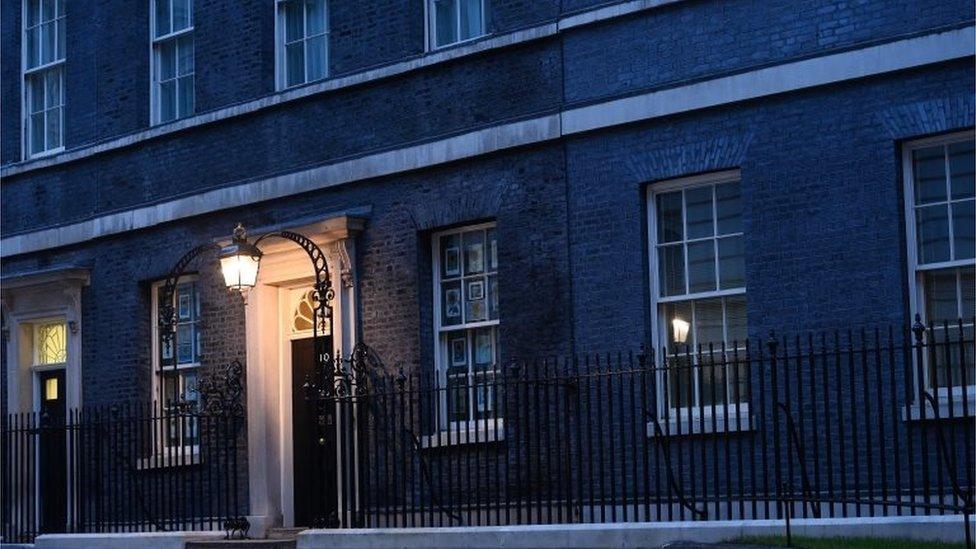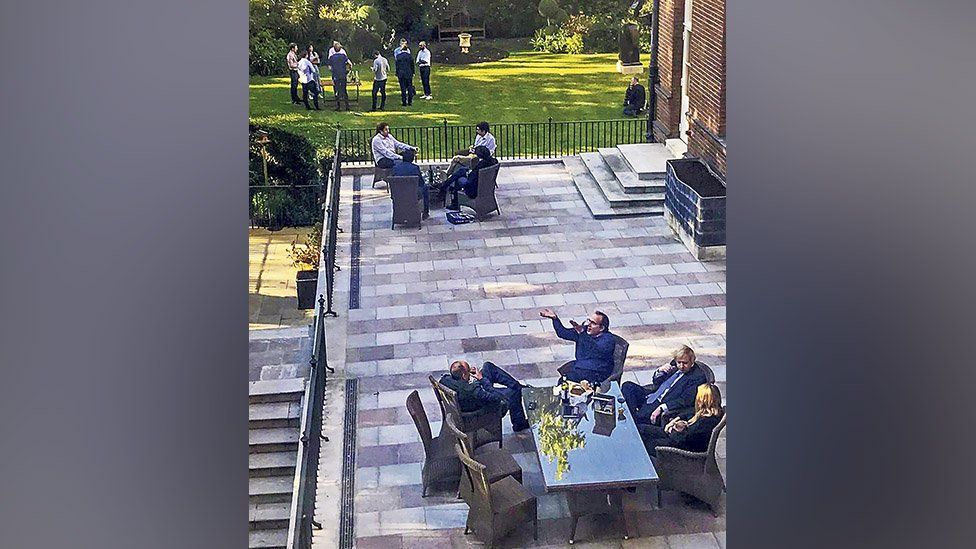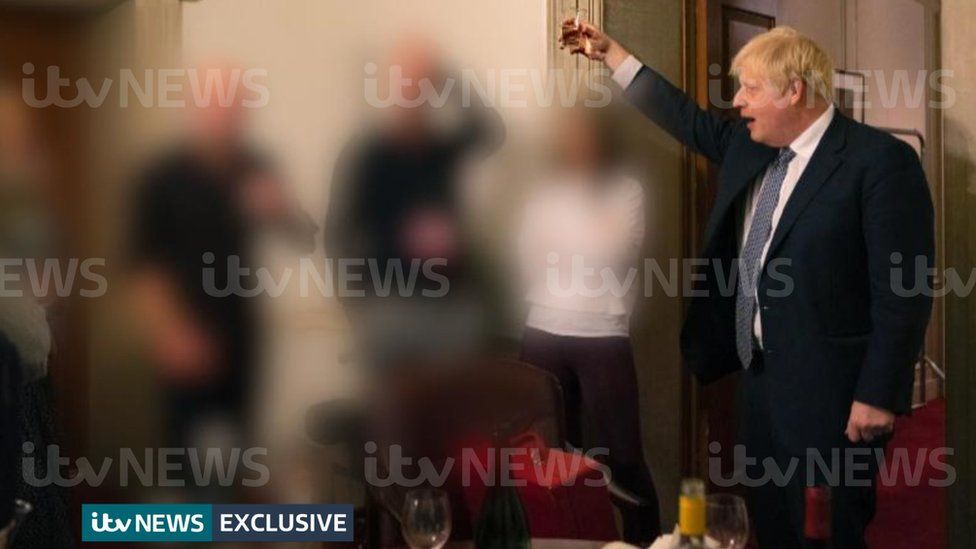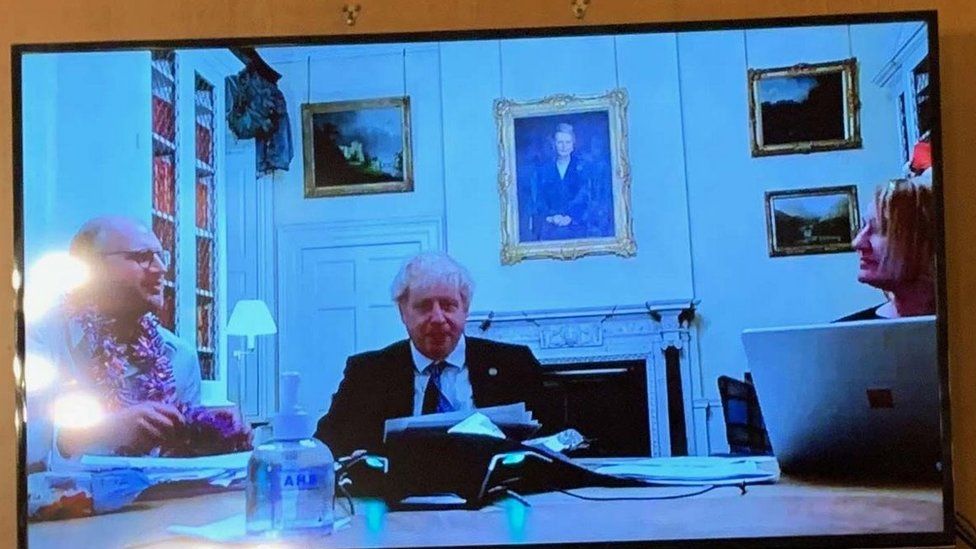Twenty fines to be issued over No 10 lockdown parties
- Published

Twenty fines will be issued as part of the police inquiry into Downing Street parties that broke Covid rules.
The Met police will not be saying who is fined or which events the fixed penalty notices relate to.
However, Downing Street has said before that it would confirm if the prime minister was facing a fine.
Fixed penalty notices are a sanction for breaking the law, and mean a fine, which needs to be paid within 28 days, or contested.
If someone chooses to contest the fine, the police will then review the case and decide whether to withdraw the fine or take the matter to court.
The police said they were attempting to progress the investigation, with a "significant amount" of material still to be assessed and that more fines could come in the future.
The police have been investigating 12 events that may have breached coronavirus lockdown rules, including at least three attended by Boris Johnson.
As part of their inquiries, they have sent out over 100 questionnaires to ask about people's participation in the events.
Reports of gatherings in Downing Street and Whitehall during the lockdown prompted public anger and several Conservative MPs called for the prime minister to resign.
However, since the outbreak of the war in Ukraine, some have withdrawn their demand.
Others have said they are withholding judgement until the police conclude their investigation, and an internal inquiry is published.
Mr Johnson had previously insisted that "guidelines were followed at all times".
He later apologised for attending a drinks party in the Downing Street garden in May 2020, but insisted that he believed it was a work event.
A No 10 spokesman said he did not believe Mr Johnson had misled the House of Commons, adding: "You will hear from the prime minister at the conclusion of the Met's investigation."
He added: "The PM's apology for how this was handled is a matter of record."
The spokesman also said Mr Johnson had not received a fine.
If either the prime minister or Simon Case - the country's most senior civil servant - got a fine, it would be made public, No 10 said.


Some of the political pressure has died down in recent weeks. Opposition parties are still calling on the prime minister to resign, but some Tory MPs are more reluctant because of the crisis in Ukraine.
There are though Conservatives who are deeply uncomfortable with the idea of lockdown parties while everyone else was being told not to mix. They will be watching to see who is fined - and how Downing Street reacts.
But whatever happens next, the police have now said they believe Covid laws were broken in government buildings where they were being set.
Remember in December, the prime minister insisted all guidelines had been followed - and denied parties had taken place.
A lot has changed in a few months.
Watch: What has Boris Johnson said before about alleged No 10 parties?

Labour's deputy leader Angela Rayner said: "After over two months of police time, 12 parties investigated and over a hundred people questioned under caution, Boris Johnson's Downing Street has been found guilty of breaking the law.
"The culture is set from the very top. The buck stops with the prime minister, who spent months lying to the British public, which is why he's got to go."
Sir Ed Davey, leader of the Liberal Democrats, said "If Boris Johnson thinks he can get away with partygate by paying expensive lawyers and throwing junior staff to the wolves, he is wrong.
"We all know who is responsible. The prime minister must resign, or Conservative MPs must sack him."
A campaign group for bereaved relatives of people who died with Covid said the prime minister "should have resigned months ago over this".
In a statement, the group said: "It's crystal clear now that whilst the British public rose to the challenge of making enormous sacrifices to protect their loved ones and their communities, those at 10 Downing Street failed."
However, former health secretary Matt Hancock defended Mr Johnson had got "the big calls" right and was was "the best person to lead the country".
He added that he would stand by the prime minister even if he was fined by the police.


What are fixed penalty notices?
Fixed penalty notices (FPNs) for breaching Covid regulations do not lead to a criminal record - they're a low-level sanction - the equivalent of a minor speeding offence - to divert people from the courts.
Each of the Metropolitan Police's 20 decisions to issue FPNs in relation to "partygate" now goes to Acro, the criminal records office for England and Wales.
It will receive and process the payments required from each person who has been found to have breached the regulations.
That means there is an official record on the system - but it is not a criminal record that must be disclosed.
If someone doesn't pay an FPN, then it becomes more serious. The notice will be referred to the courts. In the worst case scenario, a magistrate could issue a warrant for someone to be arrested and hauled before them for non-payment.
Challenging an FPN is complicated and has been much criticised as opaque and potentially unfair by expert lawyers.
Sometimes an individual police force may reverse a decision after direct lobbying.
The alternative is to argue it out in court. But that is expensive - and losing leads to a criminal conviction as it's a criminal court ruling. And that's why most people faced with an FPN suck it up - and cough up.

When stories emerged about events held in government buildings during the Covid lockdowns, senior civil servant Sue Gray was asked to lead an inquiry.
She had been due to produce her full report into the parties last month, but had to delay publication when the police announced their own investigation.
Instead Ms Gray released her initial findings in which she criticised "failures of leadership and judgement" in government.
The police have been looking into 12 of the 16 events listed in her report. Mr Johnson is known to have attended at least three of the gatherings:
20 May 2020 in the Downing Street garden
19 June 2020 in the Cabinet Room for the prime minister's birthday
13 November 2020 on the departure of a special adviser



